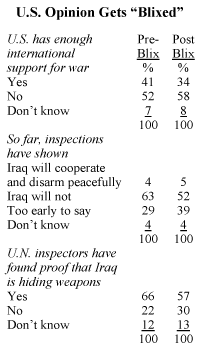Introduction and Summary
A solid 66% majority of Americans favor the use of military force against Iraq, as long as the U.S. has sufficient backing for military action from major allies. But there is a growing belief that the U.S. does not yet have enough international support to conduct the war following the Feb. 14 report by U.N. weapons inspectors Hans Blix and Mohamed ElBaradei and the mixed reception it received from members of the U.N. Security Council — as well as weekend antiwar protests around the world.

While most remain skeptical that Iraq will disarm peacefully, in the wake of Blix’s report and the contentious Security Council debate, a growing minority thinks it is too early to tell whether that can be achieved. And nearly six-in-ten Americans (57%) believe the U.S. should get a second U.N. resolution before taking military action.
These are the principal findings of a nationwide survey of 1,254 Americans conducted by the Pew Research Center in association with the Council on Foreign Relations. The survey was conducted in two waves: 632 interviews were conducted Feb. 12-13, prior to the release of the Blix report, and 622 were polled after his presentation to the Security Council (Feb. 14-18). The second wave of interviewing found the proportion saying the U.S. lacked adequate international backing to wage war rising to 58% from 52% in the first wave of the poll.
There was also a decline in the percentage of Americans who think the inspectors have proof that Iraq is trying to hide weapons of mass destruction, although a solid 57% majority believes this to be the case. And fewer Americans think Hussein had a direct role in helping the Sept. 11 hijackers when compared with a Pew survey in October (66% then, 57% now).
While worries about international backing for war have increased over the past week, there are several indications that public backing for the use of force is now on more solid ground than it was in early January, before President Bush’s State of the Union address and Secretary of State Colin Powell’s presentation before the U.N. on Feb. 5. More Americans think Bush has explained clearly why the U.S. might use military force to end Saddam Hussein’s rule (53% now vs. 42% in January). An even larger number believe that Powell clearly explained what’s at stake (61%). As a consequence, a larger number of Americans — though still a minority — say the United States should proceed with using force against Iraq even if allies do not go along (38% now vs. 26% in January).

The new poll also finds that a growing number of Americans expect a war with Iraq to be finished quickly. Nearly half (49%) say that today, compared with 38% last August. Yet the public remains worried about many possible consequences of military action, particularly the prospect that U.S. troops will face attack with chemical and biological weapons. Two-thirds express a great deal of concern about that possibility, up from 59% in October. Concern over the potential for major U.S. casualties is as high as at the start of the Persian Gulf War, and fears that war will raise the risk of domestic terrorism are much greater (57% vs. 33% in January 1991). Women are considerably more worried about all aspects of war with Iraq than are men.
Reflecting these concerns, nearly six-in-ten Americans (58%) have given a great deal of thought to the question of going to war in Iraq, almost as many who had thought about going to war on the eve of the Persian Gulf War in January 1991 (66%). Iraq topped Pew’s February News Interest Index, eclipsing strong public interest in the loss of the space shuttle Columbia, increased gasoline prices and last week’s Code Orange terrorist alert.




